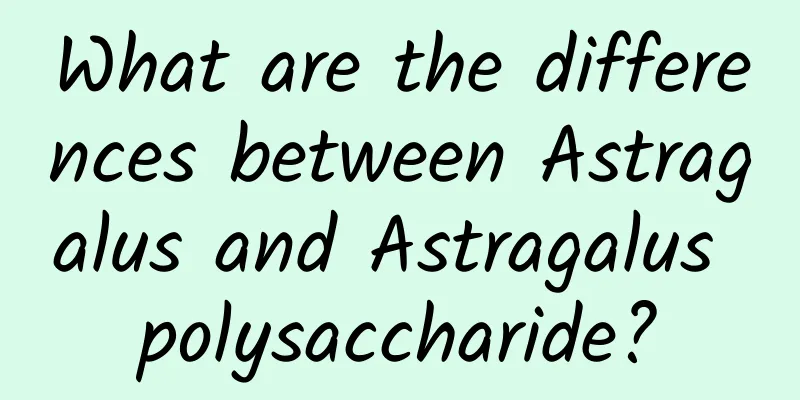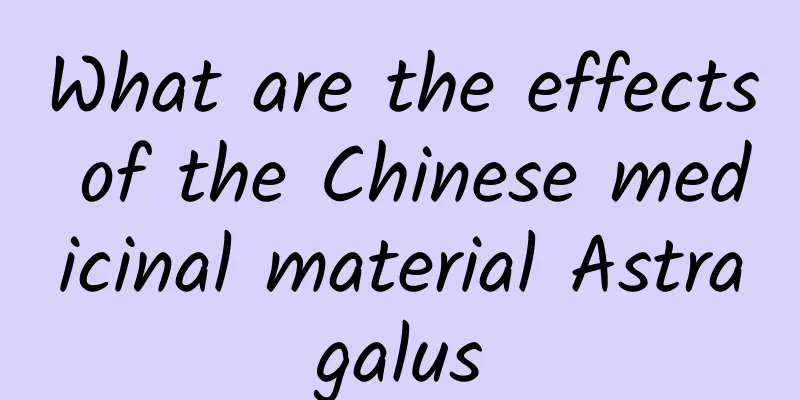What are the differences between Astragalus and Astragalus polysaccharide?

|
With the development of the times, people are becoming more and more aware of health preservation and have a better understanding of common Chinese medicinal materials in life. Astragalus is a common Chinese medicinal material and is deeply loved by people. Many people like to use Astragalus to make tea, which is very helpful for maintaining health. What are the differences between Astragalus and Astragalus polysaccharides? Let’s take a look at Astragalus and Astragalus polysaccharides. Astragalus is sweet in taste and can replenish qi and blood. Ordinary people can boil it in water and drink it, which can indeed achieve the health-preserving effects of enhancing immunity, replenishing the spleen and lung qi, and strengthening physical fitness. However, Chinese medicine emphasizes that Astragalus can be soaked in water and drunk, but the water must be freshly boiled so that the medicinal flavor can be brewed out. But even so, at most only three or four tenths of the medicinal effect can be extracted, which is a bit of a waste of medicinal materials. It is recommended that Astragalus be decocted for better results. In addition, not everyone can drink Astragalus water, it also depends on your body constitution. Generally, people with kidney yin deficiency should not take it. If you find that your tongue coating is red, your hands and feet are hot, you feel hot in your five hearts, have dry mouth and tongue, and are easily upset, these are symptoms of yin deficiency. People with this constitution are not suitable to drink Astragalus water. People with damp-heat constitution should also avoid drinking Astragalus water. If they want to take it, it is best to pair it with heat-clearing things, such as Coptis chinensis, Scutellaria baicalensis, etc. Astragalus polysaccharide is a water-soluble heteropolysaccharide obtained by extraction, concentration and purification of the dried roots of the leguminous plants Astragalus mongolica or Astragalus membranaceus. Light yellow, fine powder, uniform and free of impurities, hygroscopic. Astragalus polysaccharide is composed of hexuronic acid, glucose, fructose, rhamnose, arabinose, galacturonic acid and glucuronic acid. It can be used as an immune enhancer or regulator, and has anti-viral, anti-tumor, anti-aging, anti-radiation, anti-stress and antioxidant effects. The above is an introduction to the differences between Astragalus and Astragalus polysaccharides. If we want to better ensure the health of our body, we should learn more about some medicinal materials that are helpful for health preservation, such as astragalus, wolfberry, chrysanthemum, etc., and be familiar with their related taboos, so that we can better bring out the health-preserving effects of medicinal materials. |
<<: What are the differences between Astragalus and Roasted Astragalus?
>>: What are the differences between Astragalus and Angelica?
Recommend
315 Consumer Rights Day丨Many of the “Internet celebrity hot products” are artificially created, are your consumer rights still there?
When you think of March, what comes to your mind ...
The efficacy and function of Jiuniu potato
Traditional Chinese medicine is a Chinese traditi...
The efficacy and function of oak bark [picture]
Speaking of oak bark [picture], I believe many fr...
On average, a primordial black hole flies past the solar system every ten years.
Written by Gou Lijun Black holes are commonplace ...
The efficacy and function of jasmine leaves
Traditional Chinese medicine is very effective in...
What are the symptoms of kidney deficiency in men?
Kidney deficiency in men is quite common in daily...
If your body shows these 3 high-risk signs, it means you are really too tired!
Planning and production Source: Curious Doctor Re...
How to eat dried deer antler?
As living conditions have improved, people have n...
The efficacy and function of mountain skin strips
Shanpi strips are a kind of traditional Chinese m...
The efficacy and function of the herb
Herba Udumbara can generally help clear away heat...
The efficacy and function of Perilla
White perilla is a common Chinese medicinal mater...
Can wormwood lighten spots?
There are many reasons for spots on the face. Fre...
Why is the “Maluo emoticon package”, which is deified by young people, a monkey?
Looking back at the year 2023, there have been ma...
The efficacy and function of chrysanthemum
As a traditional Chinese medicinal material, chry...
Effects and functions of Hovenia dulcis
Hovenia dulcis is a very common and frequently us...






![[Smart Farmers] Necrosis, deformity, slow growth, how to prevent and control plant viruses?](/upload/images/67f0a8ee12640.webp)


